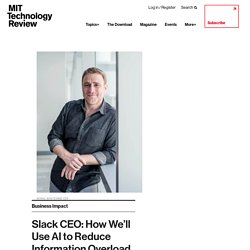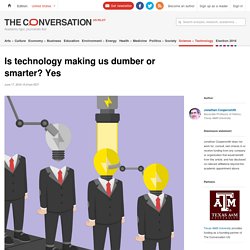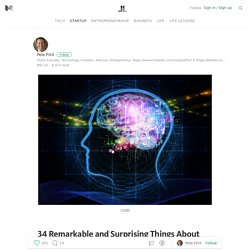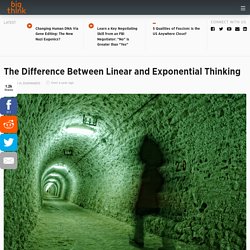

Matthieu Dubrulle
Anarchisme. Racisme. Covid. Meme. Life is a balancing act. Corruption. La tristesse. Cadeau. Interesting. Collector. Livre. Fuck that shit. Freelance. Jeu. Esprit critique, questions. Business and moral. Futurologie. Bouddhisme. Intellectual stuff. Alcool. Music. Digital Learning - EdTech. Neurosciences. Outils et méthode pour l'intelligence collective.
Joël de Rosnay - Le Carrefour du Futur. Surviving Mars, le jeu vidéo pour coloniser Mars avant Elon Musk. Slack CEO: How We’ll Use AI to Reduce Information Overload - MIT Technology Review. More than six million people use Slack every day as a hub and platform for communicating and sharing information with their coworkers.

The San Francisco–based company also just raised $250 million more in funding, in a round that puts its value at a lofty $5.1 billion (see “10 Breakthrough Technologies 2016: Slack”). But new competitors—among them Microsoft Teams, Atlassian Stride, Google Hangouts Chat, and Workplace by Facebook—are pushing into the workplace-collaboration market, challenging Slack’s dominance and, in some cases, specifically marketing themselves as more productive options. During a trip to Boston, Slack CEO Stewart Butterfield spoke to MIT Technology Review about the ways the company plans to use AI to keep people from feeling overwhelmed with data. Below is an edited excerpt from the interview. Three and a half years after its public release, Slack continues to grow, but people have also started questioning how efficient it is as a workplace tool.
Ces start-up qui veulent bidouiller le cerveau: les autres. Nous allons ici terminer cette petite série d’article sur le bidouillage du cerveau après avoir passé en revue les deux grandes start-up du domaine: Neuralink d’Elon Musk et OpnWatr de Mary Lou Jepsen.

Ces deux sociétés bien visibles ne sont pas seules sur le créneau. Vous remarquerez que je ne traite dans cette série d’articles que les plus extrêmes des projets entrepreneuriaux ou de recherche. Je n’y creuse pas la quantité de sociétés qui conçoivent depuis plusieurs années des casques d’électro-encéphalogrammes (EEG) classiques et les applications logicielles qui vont avec pour mesurer notre stress, nous endormir avec de la musique, piloter des dispositifs de commande simples, ou autres solutions «light» du genre! Il s’agit par exemple des casques de Muse, Emotiv, Neurosky, Halo Neurosciences ou des Français Dreem et aussi de Mensia Tech qui développe des solutions pour l’hyperactivité enfantine avec une technologie issue de l’INRIA, du projet Brain Machine Interface.
In the future your sales assistant could be a robot. This fall, customers cruising the aisles of Lowe’s home improvement stores in the San Francisco Bay Area may see a new type of employee taking inventory and assisting shoppers.

You won’t find a nametag on this worker, but you won’t confuse it with other employees, either. The new kid in town is the LoweBot, an autonomous retail service robot that scans and audits store inventory on the floor. It uses voice recognition to identify products for customers and lead them to the right shelf — in multiple languages. Is technology making us more or less intelligent?
Editor’s note: This article is part of our collaboration with Point Taken, a new program from WGBH that will next air on Tuesday, June 21 on PBS and online at pbs.org.

The show features fact-based debate on major issues of the day, without the shouting. The smartphone in your hand enables you to record a video, edit it and send it around the world. With your phone, you can navigate in cities, buy a car, track your vital signs and accomplish thousands of other tasks. And so? Each of those activities used to demand learning specific skills and acquiring the necessary resources to do them.
34 Remarkable and Surprising Things About The Future — Life Learning. 34 Remarkable and Surprising Things About The Future I’ve been reading and thinking about the future a lot recently, and decided to spend a week “nerding out” at Singularity University, to satisfy my curiosity.

It was a great event, featuring experts from across the entire spectrum of technology and innovation. In this post I’ll share the ideas I’ve been developing for some time — based on my own research as well as time at spent at SU — on how we should think about the future and the myriad opportunities it presents. I am extremely optimistic about our future being a world where powerful technologies solve some of our biggest challenges across a range of industries from medicine to transportation to energy and many others.
The Difference Between Linear and Exponential Thinking. As humans we evolved on this planet over the last hundreds of thousands of years in an environment that I would call local and linear.

It was a local and linear environment because the only things that affected you as you were growing up on the plains of Africa was what was in a day’s walk. It was local to you. Something would happen on the other side of the planet 100,000 years ago you wouldn’t even know. It was linear in that the life of your great grandparents, your grandparents, you, your kids, their kids, nothing changed generation to generation. What 100 Experts Think About The Future Of Learning. If you’re an educator, surely you know that technology has and will continue to have an incredible impact on learning.

Whether it’s the Internet, innovative learning tools, or teaching technology itself, these two subjects are intertwined. In these talks, you will find essential information for educators concerned with technology. General Learn about making technology work in education and more in these talks. Rethinking the Student Experience in the 21st Century Public Research University: See how a diverse student body and technology can make a difference in the student experience today.
Sharing Education These talks explore the idea of open, shared education. What 100 Experts Think About The Future Of Learning.
Journalisme, biais et science. Infographie. Solution. New Economy. Underworld - CyberWar. Chine. Effondrement. Ecologie. Cours EM. Cours en ligne. Philo. Histoire. Life - Bio. Chatbot. Enjeux Internet.
Nootropics. Anonymity. Website tool. Universal Basic Income. Data Viz. Livres.
Mémoire. Data. Empowerment. Tools. E-RH. Big project. Public. Articles de référence. UX. Future. Autre. Digital mentor. Blockchain. Digital Nomad.